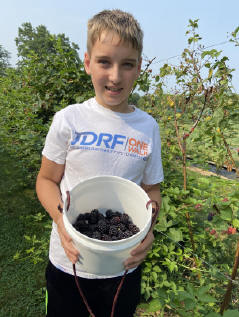
(5/12) Think about a young person that you know personally. That child is curious, loves to learn by participating, and most likely enjoys playing in the soil. What could possibly be more fun than teaching children about gardening and instilling an interest in environmentalism while allowing imagination, discovery, and exploration to happen.
Gardens provide a magical environment. They produce living plants that rise from the soil in all kinds of shapes, sizes, colors, and textures. Children love to grow fruits and vegetables and are so proud of their accomplishment when they can contribute to harvesting the food for dinner. They enjoy growing flowers and picking them for others to appreciate. One of my favorite memories is the flower bouquets that my children would proudly and lovingly present to me.
 Gardening with children opens new opportunities in a world dominated by technology. There is a magnetic attraction between children and the earth. Youngsters love to discover the germination of seeds. Gardening develops patience in a child because there is no instant gratification in a garden. Watching a plant grow and change, demonstrates to children that their efforts to treat the plant respectfully and nurture its growth have made a difference. It teaches children about love and respect for nature that will last a lifetime.
Gardening with children opens new opportunities in a world dominated by technology. There is a magnetic attraction between children and the earth. Youngsters love to discover the germination of seeds. Gardening develops patience in a child because there is no instant gratification in a garden. Watching a plant grow and change, demonstrates to children that their efforts to treat the plant respectfully and nurture its growth have made a difference. It teaches children about love and respect for nature that will last a lifetime.
Gardening requires children to practice their fine motor skills. Planting seeds, digging in the soil, pulling weeds, watering plants, and harvesting fruits and vegetables all help to improve motor skills, which can in turn help to improve their concentration and learning capabilities. An added bonus is that when children participate in the growing process of fruits and vegetables, they are more likely to gain a sense of ownership and pride over their healthy eating choices.
Many adult gardeners have fond memories of spending time in a garden with a parent, grandparent, or neighbor. I had the privilege of spending time in the garden with my grandmother. Growing vegetables was a necessity because she had a large family to feed with the produce that she harvested. As a child, I observed my father gardening. He had a very large garden that included vegetables and flowers. He provided his family with the produce and enjoyed giving most of his harvest to others who could en-joy the delicious, fresh vegetables and flowers that he lovingly grew. My family enjoyed gardening and taught me their gardening techniques. They also taught me life lessons through their gardening. I learned patience as I waited for the vegetables to grow. When I helped them tend to the garden, it taught me responsibility because a garden cannot thrive unless the grower has the commitment to take care of the plantings. As a child, gardening also taught me about
loss when flowers died at the end of the season.
Numerous crops are suitable for a young gardener. The following are relatively easy and fun to grow, and they have short growing seasons. Sunflower seeds will sprout in a week or two and grow fast. Lettuce is a reliable vegetable and is a good way to get children interested in eating salads. Choose various varieties and colors to make the child interested in raising lettuce. Cherry tomatoes are also exciting to grow. If space is not an issue, children love to grow pumpkins. Children will be enthralled to see the growing process as it begins from seed. Nurturing the young seedlings are a valuable part of the gardening experience. Some enjoyable sensory plants to grow with children are dusty miller (fuzzy), begonias (rubbery), squash vines (prickly), peppers (smooth).
Master Gardeners reap the rewards of teaching children about gardening and the stewardship of the environment. One opportunity in which Adams County Master Gardeners interact with children is Ag Explorers Day Camp. This year’s Day Camp will be held on June 20 - 24, 8:00 a.m. - 4:00 p.m. Registration will be available on-line by March 1st. The campers will learn about agriculture, gardening, and food that is grown in other cultures. The kids will have local field trips throughout the week. Children ages 8-12 are invited to attend this camp. Cost for the camp is $140.
Gardening with children has so many beneficial results. It provides children with exercise and fresh air. It makes them aware of nutritious and tasteful foods. It is exciting for a child to experience the changes in a garden. Gardening is calming for children because they can use their hands in the soil while it teaches them life lessons. It is a rewarding experience for an adult to see the excitement of gardening through the eyes of a child.
"Treat the earth well. We do not inherit the Earth from our ancestors;
we borrow it from our children." Ancient Indian Proverb